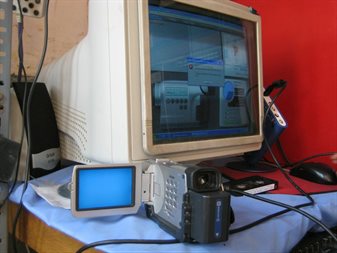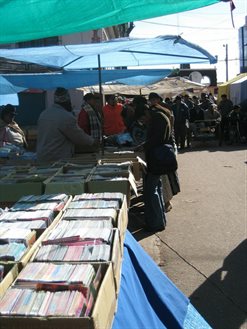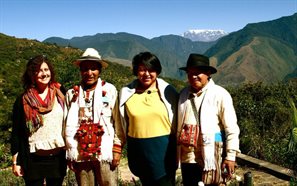3 Circulation
In
this section the workshop addressed the question of how culture circulates. To
consider this theme, the workshop’s participants discussed in a plenary session
the following hypothetical case:

A VIDEO UPLOADED TO YOUTUBE AND
A MUSICAL HIT IN JAPAN
As part of a university research
project, a student from El Alto (La Paz) travelled to a rural community called
Río Pequeño, which was celebrating a festival. The student filmed the festival’s
dances and music. Returning to the city with great enthusiasm for the music he
had heard, and confident in the technological resources available to him
(internet, computer), he decided to upload some of the videos onto Youtube. The
young man did this without including any information about the recording, such
as the place or the people performing the music. Minutes later, in Japan, a
music producer came across this Youtube clip on the Internet and incorporated
it into a music video he was making. This commercial video was recorded on DVD
and became a major hit in Japan and in other parts of the world, making a
fortune for the Japanese producer. Sometime later, a community member from Río
Pequeño was walking through the street markets of El Alto. His ears chanced
upon some music from his village being played from the speakers of a market
stall selling pirated DVDs. Approaching the stall, he could easily identify
music from his community in the Japanese music video being played. He asked for
the cover of the DVD, but on it, found no reference to his village.
Uploading
video to a computer in Bolivia - Photo credit: Henry Stobart

Due to a
lack of time, all participants discussed this case as a single group,
addressing the following questions:
- How do you feel about this case?
- Do you see any particular problem?
- How should we recognize and appreciate, in a
fair way, the different perspectives on creativity in this situation? (The
student, the public, the community member).
The plenary discussion explored the following points as well:
- Many cultural processes circulate because of a
dynamic that involves sharing, appropriation, and imitation. Often, such sharing
takes place through respectful recognition for those who came before the
present creative moment. In some cases,
such circulation may end up promoting cultures – such as those in Bolivia – to parts
of the world where they would otherwise not be known.
- Given that many cultural processes depend on
these forms of circulation, what aspects of culture should not - in your view - circulate in this way? In such cases,
how can they be protected, respected, and recognized?
Stalls
selling pirated music videos (VCDs) - Photo credit: Julio Katari
Discussion:
For
some participants, the hypothetical case represented a clear example of
appropriation that should be addressed through legal means. One participant
suggested that if the music had been registered (as intellectual property), it
could then be claimed under copyright. However, others mentioned that
SOBODAYCOM has little power to press legal cases in an international context. While
discussing the copyright registration process, the requirement for physical
evidence in the form of a score or recording was noted. Some participants proposed that physical
evidence should not be the only path to registration and recognition.
Some
people noted problems with the regular registration systems under copyright: international
legal frameworks tend to favour large culture industries;the law only recognizes individuals as authors
or composers,
thus
dismissing collectivities and/or communities; and
when
no author can be identified for a work, the material is seen as heritage of the
State.
 Other participants highlighted the importance of
documenting the origins of specific cultural expressions and called for the
protection of what is “our own.” If a country fails to do so, others will take
advantage. The well-known case of “Llorando se fue” was mentioned: a song by
the Bolivian band Los Kjarkas that the French-Brazilian group Kaoma covered
without license.
Other participants highlighted the importance of
documenting the origins of specific cultural expressions and called for the
protection of what is “our own.” If a country fails to do so, others will take
advantage. The well-known case of “Llorando se fue” was mentioned: a song by
the Bolivian band Los Kjarkas that the French-Brazilian group Kaoma covered
without license.
However, other participants pointed out the competition that
sometimes exists among neighbouring communities, with each claiming to be the
place of origin of a specific musical genre or instrument.
Issues surrounding heritage that had been scheduled for Topic 4 (the following section of the workshop) came up in this discussion.
Much was said about the flow of cultural
expressions across borders. Some participants continued proposing the idea of
cultural bridges, but they also noted problems in these encounters.
Even when researchers, many of them foreigners, arrive
with the best of intentions, they often operate within a logic that differs from
that of the community.
Phoebe Smolin, Francisco Balboa, Sharoll Fernández and Celestino Campos -
Photo credit: Phoebe Smolin
In conversations on the topic of circulation, many participants mentioned Internet technology. Some believed that cultural expressions must circulate freely around the world and saw the Internet as facilitating such movement. Others pointed out problems when these cultural expressions enter the world market, where some people are at a greater advantage because they have the hegemonic backing of the culture industries, as is the case of a singer like Jennifer López.
Some participants commented on the need to
carefully consider so-called “globalization.” While some people champion how
globalization contributes to broad access, one must also consider how economic
inequalities continue to limit access to resources like the Internet. They
spoke about the advantages and disadvantages of Youtube and other forms of
social media. On the one hand, they were seen as monsters that could not be
controlled.On the other hand, they were appreciated as a means by which
Bolivians, especially those who have migrated to other places, could share a
sense of what’s theirs, by uploading videos and images to Youtube or
Facebook.

However, even here, participants mentioned
problems surrounding those who upload images without asking for permission, and
those who do it with the idea of being the centre of attention. Some
participants also mentioned the Free Software movement that stands against the
privatization of programming and which depends on social networks to continue
improving their software programs. Others responded by pointing out that
Youtube and Facebook are not operating as networks, but rather as corporations.
Detail from poster for the project's final public roundtable event - "Do Cultures Have Owners?" - designed by Anuar Elias.
The workshop reached a consensus on the need to
promote educational policies and a sense of respect, which includes asking
permission for using cultural expressions, and properly acknowledging creators
and sources. Promoting such attitudes should occur at an internal local level,
and within or between communities. People also proposed that Bolivia should
have clear policies that establish the protection of cultures, not as objects separated from their social environments, but as part of complex social networks.